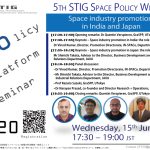【Report】
The space industry continues to grow at an accelerated speed, strengthening existing ties between the players of space activities, and allowing for new international collaborations and partnerships. This month’s space policy webinar focused on the various trends in promoting space industry in Japan and India. This seminar was not only informative but also symbolic in its intention to highlight the importance of the space policy research collaboration between Japan and India.
In his opening remarks Dr. Quentin Verspieren briefly informed about the programme opportunities with GraSPP and STIG, offered to those interested in pursuing their research in space activities. He continued to introduce the main theme and to provide an overview of the webinar, after, giving the floor to the first keynote speaker.
Dr. Vinod Kumar presented on the role and structure of IN-SPACe and its promotional activities in India’s space industry. His speech introduced four main roles of the organisation: promoter, enabler, authoriser and supervisor – roles that allow for a smooth coordination for space activities in the country. He has also highlighted the growing support of Indian government as well as future prospects on fostering space startup ecosystem.
Second keynote speaker Mr Shinichi Takata reported on the space industry promotion in Japan and the role of JAXA. After sharing a brief summary of JAXA’s structure, Mr. Takata noted the growing centrality of the organisations R&D programme in promoting collaboration with academia and space industry. He has also presented the ongoing co-creation activities between JAXA and private companies, four of which have been successfully commercialised. Mr. Takata concluded with a note on the expanding business engagement in Japan’s space ecosystem.
This was followed by an insight into the webinar’s co-host organisation Spaceport SARABHAI by Dr. Narayan Prasad. Spaceport SARABHAI is India’s independent think tank dedicated to only space activities, with an aim to generate evidence-based knowledge for policymaking regarding space industry. Dr. Prasad emphasised its role in serving as an organizer of the value chain in India’s strengthening future space sector.
This started an opening for the panel discussion with Professor Kazuto Suzuki addressing the main trends and mechanism of Japan’s commercial space industry. Professor Suzuki highlighted the shifting mindset of new entrepreneurs in Japan, inspired by successful startups in the US, as one of the driving factors for the rapid growth of the commercial space sector. He also noted the role of government that came in later to support growing startups through various programmes. Continuing this discussion, Dr. Prasad Narayan, similarly noted a mindset shift in India’s space industry with growing number of startups taking risks to launch own products. Dr. Narayan added that this trend is happening within the bigger picture of the growing success of larger technology industries in India. The panel discussion continued by addressing the main dynamics in the collaboration between various space industry stakeholders, and the ongoing projects on improving these partnerships, as well as various initiatives in promoting space industry in both India and Japan. The discussions have provided a good comparative overview of the space industry promotion practices in both countries, facilitating a crucial knowledge exchange. The panel has also addressed some of the questions in the audience thus concluding the event.
In his closing remarks, Dr. Verspieren shared information on the upcoming schedule for the 6th Space Policy Webinar, which is planned for September 2022.
Visit our STIG You Tube channel
【Webinar Overview】
Date & Time:
Wednesday 15 June 2022, 17:30-19:00 JST
Venue:
Online (The Webinar access information will be sent to the registrants before the event)
Language:
English (no Japanese interpretation available)
Organizer:
Science, Technology and Innovation Governance (STIG) Program, Graduate School of Public Policy, The University of Tokyo.
Co-organizer:
Spaceport SARABHAI
Registration:
Please apply from the REGISTRATION FORM (https://forms.gle/LNMdLKQSddTJ1p8L8)
*If you cannot open the page, please email us at STIG@pp.u-tokyo.ac.jp, including your name and institution.
– Program –
[17:30-17:40] Opening remarks:
Dr Quentin Verspieren, The University of Tokyo
[17:40-17:55] Keynote – Space industry promotion in India: the role of IN-SPACe
Dr Vinod Kumar, Director, Promotion Directorate, IN-SPACe, Department of Space
[17:55-18:10] Keynote – Space industry promotion in Japan: the role of JAXA
Mr Shinichi Takata, Advisor to the Director, Business Development and Industrial Relations Department, Japan Aerospace Exploration Agency (JAXA)
[18:10-18:55] Panel discussion:
• Dr Vinod Kumar, Director, Promotion Directorate, IN-SPACe, Department of Space
• Mr Shinichi Takata, Advisor to the Director, Business Development and Industrial Relations Department, Japan Aerospace Exploration Agency (JAXA)
• Professor Kazuto Suzuki, Professor, Graduate School of Public Policy, The University of Tokyo
• Dr Narayan Prasad, co-founder and Director Research + Operations, Spaceport SARABHAI
[18:55-19:00] Closing remarks:
Dr Quentin Verspieren, The University of Tokyo
Speakers:
 |
Dr Vinod Kumar, Director, Promotion Directorate, IN-SPACe, Department of Space Dr Vinod Kumar is presently Director, Promotion Director at IN-SPACe/ Department of Space. This task involves the promotion of Non-Government Entities (NGEs) in the space sector. India National Space Promotion & Authorisation Centre (IN-SPACe) is an independent nodal agency under Department of Space for promotion & authorising space activities and usage of DOS owned facilities by NGEs. IN-SPACe is the single window nodal agency, with its own cadre. Before joining IN-SPACe he was working for ISRO as Division Head of GEO Control Dynamics Design Division. He also worked as Deputy Project Director, Attitude and Orbit Control System, U R Rao Satellite Centre (URSC), Bengaluru. He is fellow of the Institution of Engineers (IEI), India and The Institution of Electronics and Telecommunication Engineers (IETE). He joined URSC in 1997, where he has been involved with the design and development of Attitude and Orbit Control Systems of over three dozen satellites in the last nearly 25 years. He has developed crucial technologies for satellites and a critical mirror motion compensation technique for ISRO’s meteorological satellite series. He has also developed autonomy for GEO satellites which has become the backbone of ISRO’s fleet of spacecraft including Mars Orbiter Mission. He has been awarded ISRO team excellence award in 2006 by His Excellency former President of India Dr A.P.J. Abdul Kalam for in orbit management of spacecraft operations. He was again chosen for team excellence award in 2011 for GSAT-12 spacecraft AOCS design, development and realization. Dr Vinod is alumnus of Indian Institute of Technology, Bombay. In his doctoral research, he developed autonomous navigation techniques for collocated geostationary satellites at a desired longitude using Indian Regional Navigation Satellites System (IRNSS/NavIC). He is an ISO 9001:2015 certified Lead Auditor from the Indian Institute of Quality Management. He has over three dozen publications in National and International reputed journals and conferences. His additional technical interests include “Missile detection, AI, Terrain navigation, Guidance, Pulsar navigation, Space re-entry, Mars explorations and interplanetary missions”. Before joining the URSC, he worked with Indian Air Force, on fighter aircraft control systems and also held Faculty position at Regional Engineering College, Haryana, India and SJPML Institute of Technology, Radaur, Haryana. |
 |
Mr Shinichi Takata, Advisor to the Director/J-SPARC Producer, Business Development and Industrial Relations Department, Japan Aerospace Exploration Agency (JAXA) Shinichi Takata was engaged in rocket engine development and system integration of the H-IIA launch vehicle (2001-2005), development and operation of the H-II Transfer Vehicle (HTV) (2005-2014), and international coordination of the International Space Station (ISS) program in Houston (2014-2017). After returning to Japan, he launched the J-SPARC (JAXA Space Innovation through Partnership and Co-creation) program and is promoting multiple value co-creation activities aimed at improving JAXA’s R&D capabilities and creating new private businesses. Shinichi Takata is also a Co-Founder and Director of Space Port Japan Association. He wrote a titled “Research of Turbo-fan/Ramjet Combined Cycled Engine” and has a Master’s Degree from the Department of Aeronautics and Astronautics, University of Tokyo. He also has a Bachelor from the Department of Aeronautics and Astronautics, University of Tokyo. |
 |
Professor Kazuto Suzuki, Professor, Graduate School of Public Policy, The University of Tokyo Kazuto Suzuki is Professor of Science and Technology Policy at the Graduate School of Public Policy at the University of Tokyo, Japan, and senior fellow of Asia Pacific Initiative (API), the independent policy thinktank. He graduated Department of International Relations, Ritsumeikan University, and received Ph.D. from Sussex European Institute, University of Sussex, England. He has worked in the Fondation pour la recherche stratégique in Paris, France as assistant researcher and the Associate Professor at the University of Tsukuba from 2000 to 2008 and served as Professor of International Politics at Hokkaido University until 2020. He served as an expert in the Panel of Experts for Iranian Sanction Committee under the United Nations Security Council from 2013 to July 2015. He currently serves as the President of Japan Association of International Security and Trade. His research focuses on the conjunction of science/technology and international relations; subjects including space policy, non-proliferation, export control and sanctions. His recent work includes Space and International Politics (2011, in Japanese, awarded Suntory Prize for Social Sciences and Humanities), Policy Logics and Institutions of European Space Collaboration (2003) and many others. |
 |
Dr Narayan Prasad, co-founder and Director Research + Operations, Spaceport SARABHAI Narayan Prasad is co-founder and Director Research + Operations at Spaceport SARABHAI and co-founder at satsearch, a global marketplace for space supported and incubated by the European Space Agency. He was also an Associate Research Fellow at the European Space Policy Institute where he is leading a study on Europe – India cooperation in space. An awardee of Emerging Space Leaders by the International Astronautical Federation, he has been supported by the German Academic Exchange Service to pursue doctoral research at the intersection of space industry and supply chain management. Narayan is supporting the development of a NewSpace industry ecosystem in India by working with startups such as Bellatrix Aerospace, SatSure alongside the Government of Kerala’s initiative to create a home for NewSpace in India. He believes that there is an opportunity to create a $25 billion space industry ecosystem in India by 2030 which can take space-based products and services from India to the rest of the world. He has authored over 50 articles in various national and international publications and has previously studied in India, Germany, Sweden and France. He can be reached by email on narayan@satsearch.co or @cosmosguru on Twitter. |
 |
Dr Quentin Verspieren, The University of Tokyo Quentin Verspieren is Assistant Professor at the Science, Technology, and Innovation Governance (STIG) program of the University of Tokyo’s Graduate School of Public Policy and Associate Research Fellow at the European Space Policy Institute (ESPI). His research primarily focusses on space policymaking and technology development in developing countries and on international regime-making for space security, safety and sustainability. Dr Verspieren has two master’s degrees in aerospace engineering (ISAE-SUPAERO and The University of Tokyo) and a Ph.D. in public policy (The University of Tokyo). |

Enlarge the flyer.
Contact:
Science, Technology, and Innovation Governance (STIG) Program
Graduate School of Public Policy, The University of Tokyo
STIG@pp.u-tokyo.ac.jp